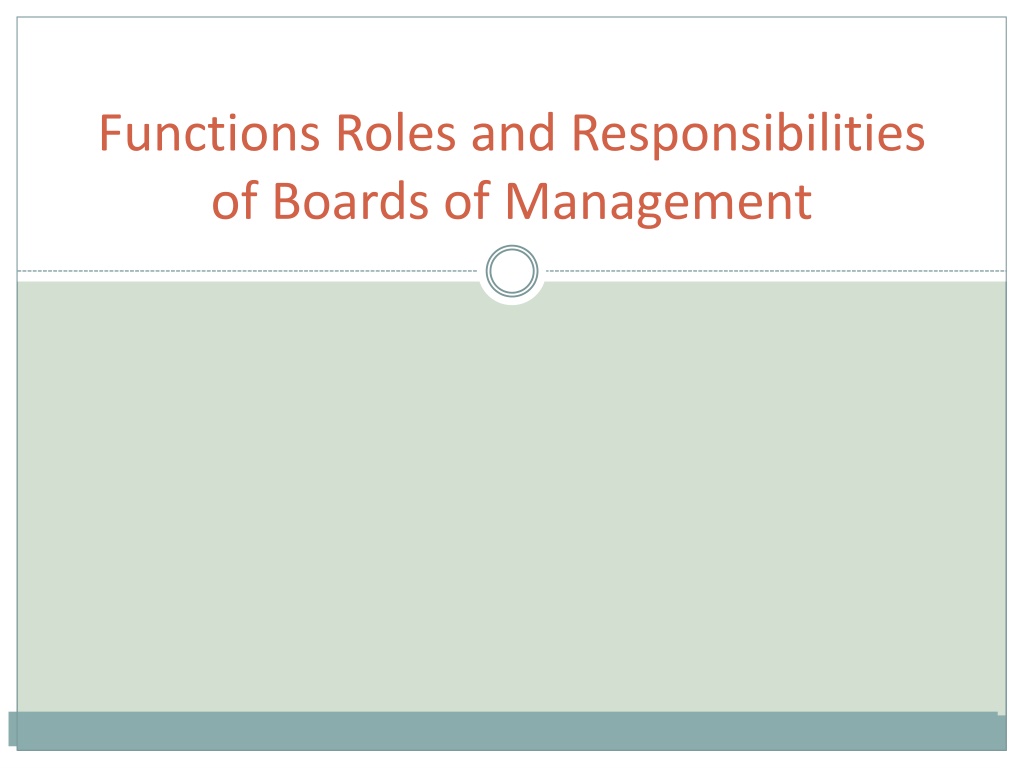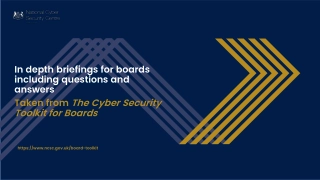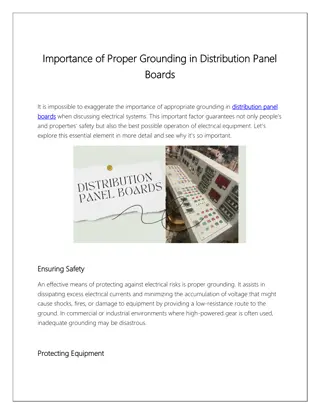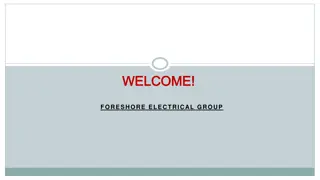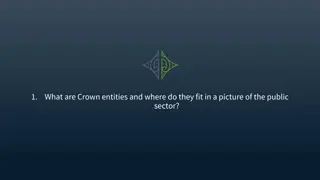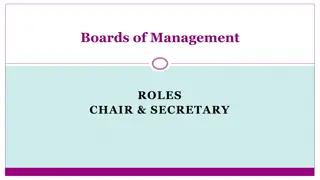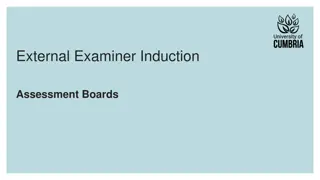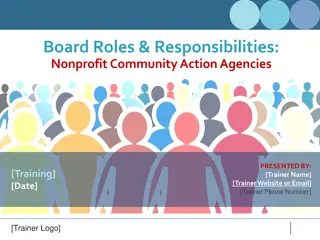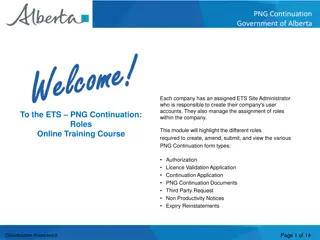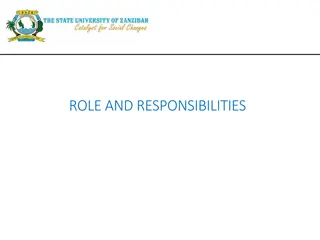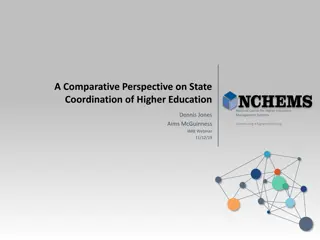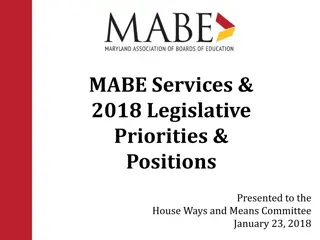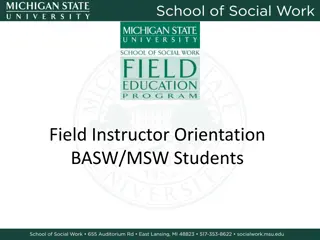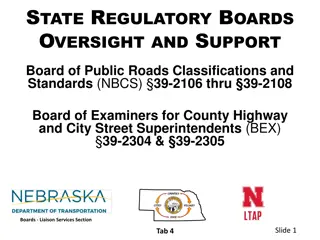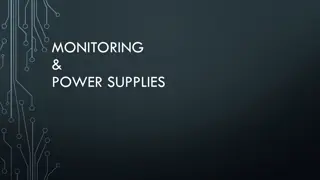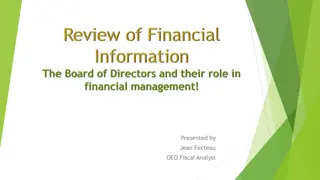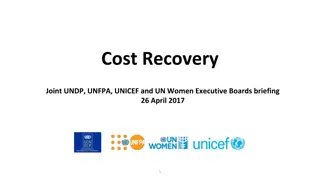Roles and Responsibilities of Boards of Management in Education
Boards of Management in education institutions are responsible for managing schools/colleges in cooperation with patrons, providing appropriate education, ensuring compliance with policies, promoting students' development, assessing school performance, fostering equal opportunities, and preserving cultural traditions. Board members also oversee admissions policies, language maintenance, staff development, and record-keeping to facilitate student progress.
Download Presentation

Please find below an Image/Link to download the presentation.
The content on the website is provided AS IS for your information and personal use only. It may not be sold, licensed, or shared on other websites without obtaining consent from the author. Download presentation by click this link. If you encounter any issues during the download, it is possible that the publisher has removed the file from their server.
E N D
Presentation Transcript
Functions Roles and Responsibilities of Boards of Management
Section 15 (1) Education Act, 1998: It shall be the duty of a board to manage the school/college on behalf of and in cooperation with the patron and for the benefit of the students and their parents and to provide or cause to be provided an appropriate education for each student at the school/college for which the board has responsibility
Board Composition Three/four ETB Nominees College three members nominated by the Bishop/trustee partner Other religious Nominee Two Parent Nominees Two Teaching Staff Nominees Secretary / Principal Board of Managements Nominee(s)
Role & Functions of Board Members To promote the moral, spiritual, social, and personal development of students having regard to the characteristic spirit of the school; To ensure that special educational needs are identified and provided for; To ensure that the school complies with the education policies, regulations and curriculum prescribed by the Minister; To ensure that students have access to appropriate guidance to assist them in their educational and career choices;
Role & Functions of Board Members (Cont.) To ensure that the school maintains systems whereby its performance can be assessed; To ensure that the school establishes and maintains an admissions and participation policy that provides for maximum accessibility; To ensure that the school promotes equality of opportunity for both male and female students and staff of the school; To ensure that the school promotes the development of the Irish language and traditions, Irish literature, the arts and other cultural matters;
Role & Functions of Board Members (Cont.) To ensure appropriate record keeping , security and access to records kept by that school relating to the progress of each student; In the case of a school located in the Gaeltacht area, to ensure that the school contributes to the maintenance of Irish as the primary community language; To ensure that the needs of personnel involved in management functions and staff development needs generally in the school are identified and provided for; To ensure that the school promotes, educational opportunities for persons living in the area in line with policies on lifelong learning; To ensure that the school establishes and maintains contact with other schools and colleges.
Key Duties of the Board Two key duties underpin the work of school board members. The duty to act, at all times, in the best interests of the whole school and the ETB and Trustee Partner (where applicable) which means avoiding any perception that they are promoting personal or particular sectional interests. The duty to exercise due care, skill and diligence, which means board members: attend board meetings regularly and come prepared to meetings, make reasonable efforts to inform themselves about matters relevant to their work on the board, avail of the training provided for board members, and set aside time each year to get to know the staff and the facilities. 1. 2.
7 Principles of Public Life Selflessness Integrity Objectivity Accountability Openness Honesty Leadership Nolan Committee UK (1995)
Effective Boards Governance Concerned with how organisations are controlled and directed about the distribution of rights and accountabilities So this means that the Board should ensure that the rights of the school community are upheld and it must confirm that school accountabilities are fulfilled Position of Trust A fiduciary duty is a fairly antiquated term, but really what it means is that members are in a position of trust and must use their skill and knowledge in the best interest of the school
Effective Boards Interpersonal Relationships High quality interpersonal relationships and effective communication. Prof. Brennan (20110 places considerable emphasis on what she calls social systems School boards should be robust and effective social systems High quality interpersonal relationships and social systems can take some time to develop. Secretary and the Chair have an important role in this regard Hospitality is an important part of this.
Effective Boards Dealing with Disagreement Social systems are not about all members being in agreement all of the time. A well chaired effective board is able to cope with a certain amount of conflict and disagreement. A group that is able to debate important matters indicates that the group is working well and that the members are able to engage in constructive challenge about important matters. Effective chairing of meetings can make it safe for all members to express their views. In particular, experienced Chairpersons can help new members to find their voice and encourage their input.
Effective Boards Listening It is essential to speak up and express your views frankly when serving on a Board of Management. It is equally important to listen carefully and respectfully to your colleagues, giving them the time and opportunity to explain their views and perspectives. One of the most sincere forms of respect is to listen carefully to another s view.
Effective Boards Giving the Task the Time it Needs In order to engage with the role and responsibility of being a member of a BoM it is essential to engage with the tasks at hand. This means attending as many meetings as possible, and setting aside dedicated time to have read and consider policies and procedures which are sent to us in advance. Principals and their staff spend significant amounts of time drafting and refining policies and procedures and it is our job as members of a board to read these documents and offer suggested amendments where we feel they would be of benefit. Our collective knowledge builds the capacity of the Board to deal effectively with the matters at hand in the best interest of the school.
Holding Boards of Management to Account Assessing the Performance of Boards
Assessment of Performance The school is assessed (in some instances) through; WSE/MLL Subject Inspections Incidental Inspections Patterns of enrolment Examination results and access to third level Solas (where these programmes are offered) Through the external examiner process (where applicable) Investigation by the Children s Ombudsman The Court may assess the performance of a school in a civil case The Court of Public Opinion The role and function of the Board of Management may also be reviewed through these events and processes.
Whole School Evaluations Management Leadership and Learning The Education Act 1998 places an obligation on the board and staff of a school to accord inspectors every reasonable facility and co-operation in the performance of their duties. The evaluation team asks questions and collects evidence about the work of the board and the school. In your file at Appendix (x) you will find a brief examination of 10 recent WSE reports (ammonised) . References to the work of the Boards of Management have been extracted. The following slides consider some of the points raised in respect of Boards of Management
Whole School Evaluations Extracting the Learning From a selection of published Whole School Evaluations the following observations can be made about expected priorities: Focus on advancing its identified developmental priorities in a strategic way through an action plan with SMART objectives and through the inclusion of the whole-school community Expectation that the Principle and Vice Principle should have a vision including the progression of the board s priorities
Whole School Evaluations Extracting the Learning Priorities (Cont.): Provide a broad curriculum; to increase literacy and numeracy levels by developing school improvement plans in these areas; and to provide a modern, safe and up-to-date school for students and staff Prioritise areas for improvement Prioritise the development of a whole-school guidance plan
Whole School Evaluations Extracting the Learning The Board should be: Very well informed and be centrally involved in discussions on resources and on the challenges facing the school Engaged with the review and evaluation of key aspects of teaching and learning, especially in relation to curriculum provision. Kept up to date on financial matters Trained for their role, to ensure that they are fully prepared to discharge its function
Whole School Evaluations Extracting the Learning The Board should be (Cont.) Committed & dedicated Fully conversant with all initiatives in the school Aware of its legal responsibilities Engaged in the promotion of the ethos Characterised by a spirit of partnership and solidarity should be fostered Methodical and systematic
Whole School Evaluations Extracting the Learning The Board should provide: An Agreed Report Updated register of existing policies with a clear calendar for subsequent policy review Engage in audit of existing policies and establish a cycle of policy development Input sought from all stake holders The views of parents and students are routinely sought in the development and review of relevant policies. This is very good practice.
Whole School Evaluations Extracting the Learning The Board should provide (Cont.): An analysis of all evaluation reports to ascertain the valuable learning experiences which could contribute to improvement in teaching and learning and to compile these for circulation The board should provide for the publication of the School Self- Evaluation Report and the School Improvement Plan for Literacy and provide summary reports for the school community Policies published on the web site address the significant weaknesses identified
Whole School Evaluations Extracting the Learning The Board is also expected to have: The board members have strong links with the local community Collaboration with parents Engagement with whole school community A clear understanding of the value of ongoing review and development Considerable expertise and experience
Whole School Evaluation Extracting the Learning Recommendations to Boards: Focused thematic agenda (along with standard items) e.g. teaching and learning and student welfare Request periodic presentations from personnel involved in key areas of responsibility, including students Teaching and learning should be included on the agenda of all meetings Decision-making should be firmly grounded in open discussion and consensus Board of Management members should attend school events
Whole School Evaluation Extracting the Learning Recommendations to Boards (Cont.): Meet annually with student Council or individual students to address the board on specific issues Recommended that there is clarity on the relative roles and responsibilities of the board of management in the context of the ETB structures Boards also need to identify some, more long term objectives Boards in consultation with the ETB should considers the possibility of providing Post Leaving Certificate (PLC) courses or other suitable programmes if suitable for their school
The Reflective Board The need for annual appraisals What evidence do we have of an effective performance (rather than just describing the process) Boards should be constantly aware of this distinction and should be careful not to let narrative description take the place of genuine performance reporting. If boards receive accurate and informative performance data, they can have confidence that they are making decisions that are properly grounded.
